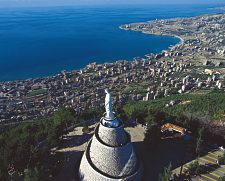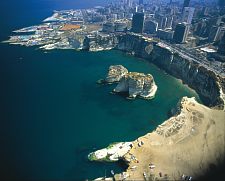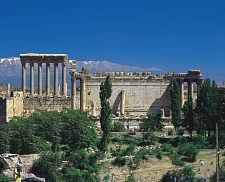|





| |
Hezbollah's Apocalypse Now
By Amal Saad-Ghorayeb
Sunday, July 23, 2006;
The Washington Post B04
BEIRUT
Power failures are creating problems across much of the city, cellphones are
unpredictable, and the regular bombing makes my neighbors cautious about going
out, leaving most people here alone with the question that has plagued them for
almost two weeks: What on earth was Hezbollah up to when it abducted two Israeli
soldiers and provoked a punishing response that is creating orphans and bringing
down buildings all around us?
As a scholar who has devoted much of my career to following Hezbollah, I have a
simple answer. I'm sure that Hezbollah had envisaged, though perhaps not
expected, a response of this kind. By provoking its southern neighbor, Hezbollah
knew it would present Israel with a ghastly choice. Hezbollah is a popular
social movement, and it is well aware that it can be destroyed only if the
Israeli army is prepared to commit mass murder, genocide, ethnic cleansing --
use whatever unpalatable term you will -- against the entire Shiite community.
Israel won't win without wiping out a religious group. However angry the
Israelis are, there must be many who won't be able to stomach that possibility,
with its hideous historic implications. That's what Hezbollah was counting on 11
days ago when its fighters took Eldad Regev and Ehud Goldwasser captive near the
Lebanese border.
Without wanting to alarm my neighbors who are adjusting to the nightly barrage
of Israeli missiles, I cannot help but cast the current conflict in apocalyptic
terms. What began as a surgical military operation staged by a relatively small
organization has metamorphosed into an existential showdown with the potential
to transform the political landscape of the Middle East. And it has put
Hezbollah in its favorite spot -- center stage, with the international community
looking on.
I've been reading this script for 11 years now, interviewing political, media
and security officials from Hezbollah. And they have given me insights into the
party's motives that go well beyond the prisoner exchange that it publicly
claims. True, Hezbollah had dubbed 2006 "the year of retrieving the prisoners"
and had warned of its intent to kidnap Israelis to secure the release of three
Lebanese held in Israel. But the seizure of these two soldiers also reflects
Hezbollah's broader goals -- both its domestic political agenda and its
regional, strategic one.
Domestically, Hezbollah has succeeded in integrating itself into the Lebanese
political system, with its two government ministers and 14 MPs. But the party
has also been keen to convince others of the importance of its resistance and of
its unrivaled efficacy as a deterrent to the threat posed by Israel.
And Israel's current onslaught has unwittingly provided Hezbollah with the
opportunity to demonstrate both -- that Israel remains Lebanon's gravest enemy,
and that Hezbollah is the only force capable of confronting it. The Lebanese
government's ineptitude in handling the crisis, coupled with the army's
sitting-duck status, only underscores that point.
Hezbollah has succeeded in elevating its regional importance, positioning itself
alongside Iran, Syria and Hamas -- the axis of terrorism in Israel's lexicon. In
this light, Hezbollah's face-off with Israel is not only a defensive war of
survival (in response to the declared Israeli and U.S. objective of eliminating
the organization), but also an attempt to shatter the myth of Israeli
invincibility (which explains why Israel also views this conflict in existential
terms).
Most of all, though, Hezbollah hopes to set a new precedent in the Arab world,
as its leader Hasan Nasrallah revealed in his latest televised speech: He
characterized his movement as a "spearhead of the [Islamic] umma" and declared
the conflict as "surpassing Lebanon . . . it is the conflict of the umma," whose
success or failure will reverberate in the entire region. In other words,
Hezbollah is to serve as an inspiration, as an exemplar of bold action against
Israel and, by extension, against Arab regimes that have allied themselves with
the United States and Israel.
With so much at stake, it is likely that Hezbollah foresaw Israel's overreaction
and laid out contingency plans. Its daily displays of its long-range missiles
are more than empty exercises in psychological warfare. Echoing in my mind are
the words of a Hezbollah official. He told me that Iranian President Mahmoud
Ahmadinejad's ongoing anti-Zionism, along with Iranian supreme religious leader
Ali Khamenei's affirmation that Hezbollah will never disarm, has given the
movement confidence that it can "fight for months."
Hezbollah is launching missiles deeper into Israeli territory than it ever has
before. It is bringing the war to Israelis' doorsteps in the hope that they will
pressure their government to call for an unconditional cease-fire. And it wants
to demoralize the Israeli army, one Hezbollah official told me.
It is hard to gauge public opinion here today. From the snippets of conversation
I pick up, people remain polarized, as they were before the war: On one end are
those (mainly non-Shiites) who lay the blame for Israel's destruction of Lebanon
squarely on Hezbollah for having picked the fight; and on the other are those
(overwhelmingly Shiite) who believe, as one man told me, that "we should fight
to the death." But there are also many in between whose initial anger at
Hezbollah is being replaced by rage at Israel. Those sentiments remind me of
1982, when Israel's invasion of Lebanon gave birth to Hezbollah.
Given its current position of strength, Hezbollah is in no mood to settle for
anything less than its original demand for a prisoner exchange, as Nasrallah
asserted in a recent interview on al-Jazeera. Why would Hezbollah agree to any
of the diplomatic proposals being floated? The idea of deploying the Lebanese
army to the south to serve as a buffer between Israel and Hezbollah would be
tantamount to the party's military neutralization. And the notion of stationing
multinational troops there is even more far-fetched, given that Hezbollah and
the Shiite community would view them as occupiers.
Leaving Israel to significantly weaken Hezbollah's military infrastructure would
have equally perilous consequences. If there is anything more dangerous than a
strong Hezbollah, it is a weak Hezbollah. One can only imagine what would happen
if the organization were left bereft of leadership, clinging to its remaining
weapons and operating underground, while the Shiite community is seething with
resentment at Israel, the United States and the government that it perceives as
its betrayer. As one Hezbollah member said, "All hell would be let loose."
Which is a reminder that although this past week has been bad, we haven't seen
hell yet.
Amal Saad-Ghorayeb teaches at the Lebanese American University in Beirut and
is the author of "Hizbu'llah: Politics and Religion" (Pluto Press).
|